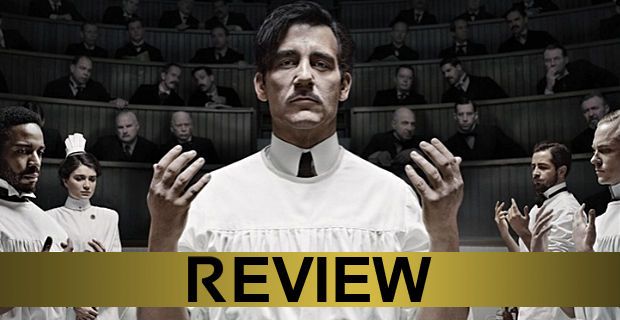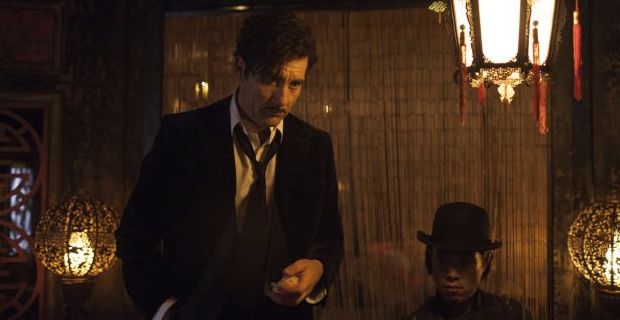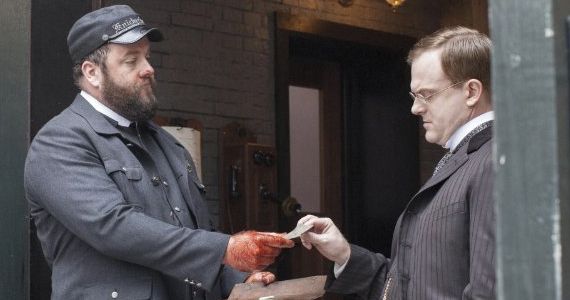[This is a review of The Knick season 1, episode 2. There will be SPOILERS.]
-
In its second episode, The Knick is less concerned with proving itself to be a period medical drama than it is in depicting how, even while many characters as well as the titular hospital stand on the precipice of great discoveries and advancements, the obstacles or barriers keeping them from succeeding and achieving their goals are, unsurprisingly, quite familiar.
As such, the scientific progression that sometimes eludes Dr. Thackery and the rest of the Knick's team of surgeons – seen in the series' graphic, cringe-inducing medical procedures and treatments – is then mirrored in the predicaments of the other characters and their limitations based on race, gender, or financial situation.
Everyone is beholden to or hamstrung by an individual, a social construct, or both. In 'Mr. Paris Shoes,' the notion is explored by how the characters interact with the world beyond their professions, and how, once the characters have converged at the series' setting, the status of each is re-adjusted not only by his or her social standing, but also by the title given to them at the hospital.
The obvious outlier in this situation is, of course, Dr. Algernon Edwards, who despite being second only to Dr. Thackery in title is relegated to a storeroom in the hospital's basement, and kept away from doing anything beyond the most routine tasks.
Aware of his predicament, Edwards is quick to question whether Dr. Chickering's polite conversation over his shoulder as a young girl's arm is sutured is in fact an effort to check up on him, rather than to extend the sole welcoming hand he's had from the hospital staff not named Cornelia Robertson or Herman Barrow.
His dilemma shines a light on the The Knick's tag of: 'Modern Medicine Had to Start Somewhere' by showing how progress is often a slow, lurching process that frequently only benefits those who have already been given the lion's share of advantages anyway. And while Cornelia is taken aback by Algernon's treatment by Thackery, Gallinger, and anyone else complicit in shuffling him off to the basement, Dr. Edwards is equally quick to assure her that such behavior was not unexpected.
So, instead of fighting a losing battle against the powers that be at the Knick, Edwards subverts the expectation that his deplorable treatment would result in his resignation, and converts his basement office into an after-hours treatment facility for those who, like him, have been refused the benefits of what the Knick has to offer.
Edwards' situation in the hospital is oddly similar to the one he has at the cramped boarding house in which he currently resides. His exchange with the man in the hallway demonstrates how, regardless of the setting, the doctor is always the odd man out; Algernon can no more enjoy the fruits of his labors as he can his travels, as his Parisian footwear is taken for an expression of superiority that he is lording over his fellow boarder. And, as he's left to fend for himself at the Knick, Edwards finds himself in a similar predicament at his place of residence.
The plight of Dr. Algernon Edwards dominates much of the episode – which is fitting, given its title – but what's most striking is the way in which Edwards' response to his predicament (in either case) is to take decisive action. Action, in essence, becomes his opiate, which is in stark contrast to Thackery's decision to use actual opiates (and more) to combat the difficulties stemming from his professional life (considering his personal time is seemingly eaten up by trying to come down off the cocaine he uses throughout the day).
And yet, despite the dramatic differences in their self-prescribed treatments, the common line between Thackery and Edwards is: both men's extra-curricular activities will likely lead to more trouble down the line.
Whether it is exploring racial prejudice, drug addiction, the limitations of Cornelia's authority and influence based on her gender, or Barrow's extreme debt, 'Mr. Paris Shoes' takes a similar matter-of-fact approach as it does to the attention-grabbing surgical scenes that spare no one's feelings, as patients are turned inside out and left that way for the audience to see.
It's a satisfying second episode that plays off the premiere's set-up quite well, while also demonstrating where the series' storytelling strengths are. Unsurprisingly, the majority of those strengths are evident through Soderbergh's meticulous eye.
Here, he excels at creating truly masterful long takes that are not only tremendous to watch, they also artfully expose the fragile, often malfunctioning interiors of everyone on the show, whether they're lying on the operating table or not.
The Knick continues next Friday with 'The Busy Flea' @10pm on Cinemax.
Photos: Mary Cybulski/ Cinemax



